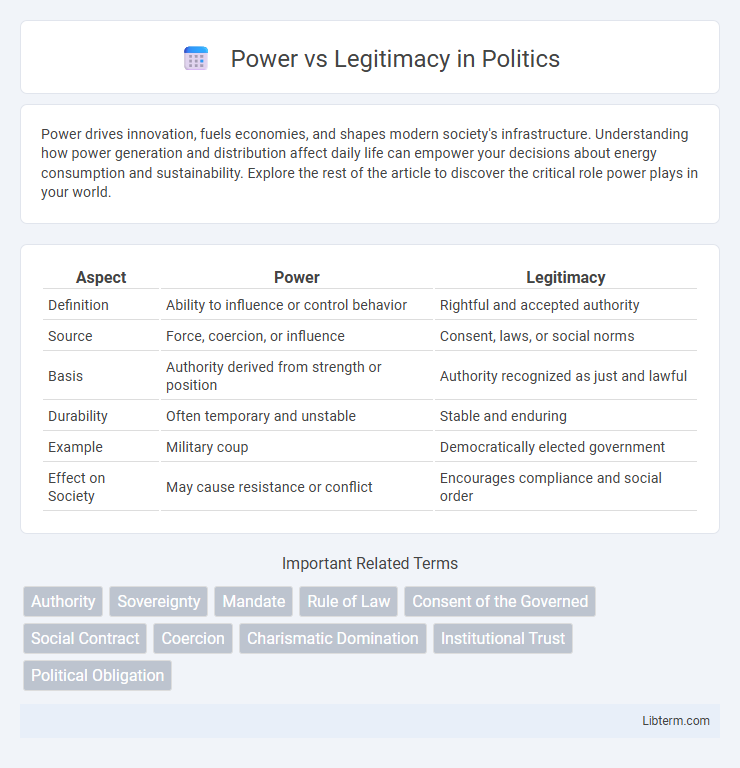Power drives innovation, fuels economies, and shapes modern society's infrastructure. Understanding how power generation and distribution affect daily life can empower your decisions about energy consumption and sustainability. Explore the rest of the article to discover the critical role power plays in your world.
Table of Comparison
| Aspect | Power | Legitimacy |
|---|---|---|
| Definition | Ability to influence or control behavior | Rightful and accepted authority |
| Source | Force, coercion, or influence | Consent, laws, or social norms |
| Basis | Authority derived from strength or position | Authority recognized as just and lawful |
| Durability | Often temporary and unstable | Stable and enduring |
| Example | Military coup | Democratically elected government |
| Effect on Society | May cause resistance or conflict | Encourages compliance and social order |
Understanding Power and Legitimacy
Power refers to the ability of an individual or group to influence others' behavior or decisions, often derived from authority, control over resources, or coercive capabilities. Legitimacy is the recognized right to exercise power, grounded in social norms, legal frameworks, or moral principles that grant acceptance and justification. Understanding the distinction between power and legitimacy is crucial for assessing the stability and effectiveness of governance, leadership, and institutional authority.
Defining the Concepts: Power vs Legitimacy
Power represents the capacity of an individual or group to influence or control the behavior of others, often through authority, coercion, or resources. Legitimacy refers to the recognized right or acceptance of an authority, typically grounded in legal, moral, or social norms that justify power. Distinguishing the two clarifies that power can exist without legitimacy, but sustainable governance depends on a balance where power is perceived as legitimate by the governed.
Historical Perspectives on Power and Legitimacy
Historical perspectives on power and legitimacy reveal that power often derives from authority recognized by social and political institutions, as theorized by Max Weber's classifications of traditional, charismatic, and legal-rational legitimacy. The evolution of legitimacy reflects shifts from divine right and monarchic rule to popular sovereignty and constitutional governance, shaping modern political structures. Understanding these historical frameworks highlights the dynamic interplay between coercive power and normative acceptance essential for sustainable governance.
Sources of Power in Society
Power in society stems from diverse sources including authority, coercion, expertise, and social influence, each shaping how individuals and groups assert control. Legitimacy originates when power is recognized as rightful and justified, often derived from legal frameworks, cultural norms, or charismatic leadership. Understanding the interplay between these power sources and their legitimation clarifies societal stability and governance dynamics.
Foundations of Legitimacy in Governance
Foundations of legitimacy in governance stem from the consent of the governed, adherence to established laws, and alignment with societal values and norms. Legitimate authority relies on transparency, accountability, and the perceived fairness of decision-making processes within political institutions. Power exercised without legitimacy risks social unrest, whereas governance grounded in legitimacy ensures stability and public trust.
The Relationship between Power and Legitimacy
Power derives its effectiveness from legitimacy, as authority perceived as rightful fosters voluntary compliance, enhancing control and governance stability. When legitimacy wanes, power risks becoming coercive and unstable, often provoking resistance or conflict. The dynamic relationship between power and legitimacy shapes political order, determining whether authority is accepted or contested within society.
Power without Legitimacy: Risks and Outcomes
Power without legitimacy often leads to resistance, social unrest, and instability, as authority is perceived as unjust or coercive. Such power structures risk losing public trust, which undermines their ability to enforce laws or policies effectively. Historical examples show dictatorships and authoritarian regimes collapsing due to widespread delegitimization despite holding substantial power.
Legitimacy without Power: Challenges and Limitations
Legitimacy without power often results in ineffectiveness, as the acknowledged right to lead lacks enforcement capabilities, leading to challenges in decision implementation and governance stability. Institutions or leaders may face significant limitations when their authority is respected in theory but cannot be practically upheld, causing reliance on voluntary compliance rather than control mechanisms. This disparity between legitimacy and power can undermine policy execution, reduce stakeholder trust, and foster vulnerabilities to external pressures or internal dissent.
Case Studies: Power and Legitimacy in Action
Case studies analyzing power versus legitimacy reveal how authority rooted solely in power often faces resistance, while legitimacy grounded in accepted norms fosters compliance and stability. For example, the Civil Rights Movement in the United States demonstrated how legitimized demands for equal rights challenged power structures, leading to significant social change. Similarly, authoritarian regimes may maintain control through power, but lack of legitimacy can incite civil unrest and delegitimize their rule over time.
Enhancing Legitimacy to Sustain Power
Enhancing legitimacy is crucial for sustaining power as it fosters trust and acceptance among stakeholders, reducing resistance and increasing cooperation. By aligning actions with ethical standards, legal frameworks, and community values, leaders solidify their authority and ensure long-term stability. Continuous transparency, accountability, and engagement are key strategies to maintain legitimacy and reinforce the durability of power structures.
Power Infographic

 libterm.com
libterm.com